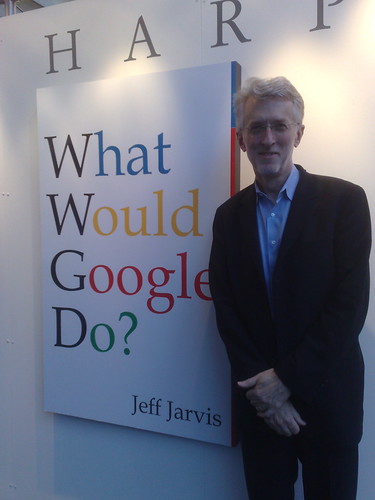The Future of Advertising: Just Ask "What Would Google Do?"

Jeff Jarvis' new book, What Would Google Do?, is a must-read and a real eye opener. Here is a Q&A that Jeff graciously participated in for my column in Advertising Age...
Jeff Lebowski is ... the Dude. Vestibulum id ligula porta felis euismod semper. Maecenas sed diam eget risus varius blandit sit amet non magna. Curabitur blandit tempus porttitor.

Jeff Jarvis' new book, What Would Google Do?, is a must-read and a real eye opener. Here is a Q&A that Jeff graciously participated in for my column in Advertising Age...
Four years ago I wrote this...
"One day CRM systems will bolt in blog monitoring functionality so these posts automatically get funneled to the right place. For now, they need to be handled onesie twosie - but handled nonetheless."
Now today Salesforce.com has added Twitter customer service tools to its already formidable suite. Forrester Analyst Jeremiah Owyang sees Twitter's future as social CRM.
However, I don't think Twitter will be the only game in town. There will be lot of venues to vent, all of which can have an impact on brand reputation as journalists discover all of this conversation through Google, Twitter Search and other search engines. GetSatisfaction.com is growing. I wrote about this in our most recent white paper (see trend one).
In addition, I cover this in my first vlog on the Edelman Facebook page (forgive the acting!). My takeaway is that this isn't just a CRM concern, but rather it requires close coordination between customer service and PR. There's a great study on this from SNCR. What's your view?
There's a common misperception out there that all of the blogging, Twittering and Facebooking is being done by twenty and thirty-somethings. That, in fact, turns out not to be true. Baby Boomers (those born 1946-1964) are the fastest growing users of social networking sites and are also increasingly reading blogs too. Meanwhile, Gen Y interest in these services has plateaued. This all according to the latest Consumer Electronics Usage Survey from Accenture.

According to the study, baby boomers...
Meanwhile, Gen Y...
The baby boomer results don't surprise me. What does jump out at me is how the most technologically savvy generation we have seen to date is slowing their adoption. Could they be suffering from social fatigue or do they have enough technology in their lives already? Perhaps they are returning toward more face-to-face venues, which anecdotally, I have heard. It will be interesting to see how this progresses next year.
Additional data from the latest Accenture report is summarized here from TWICE.